Monthly Market Report: July 2020
Government Stimulus Propels Developed Markets
Prepared by Brandon Yee, CFA, CAIA, and Thomas Connelly, CFA, CFP®
DEVELOPED MARKETS
In the month of July, international developed stock markets returned 2.66%. Canada and the U.S. recorded returns of 5.98% and 5.90%, respectively. The U.K. and Japan lagged the broader market. Year to date returns have bounced back considerably since the March lows. The U.S. market is up 3.30% while Europe ex UK is only down -4.98%. Historic peacetime monetary and fiscal stimulus have helped prop up markets. The European Union passed an $857 billion fiscal stimulus package towards the end of July, with almost half of the stimulus coming in the form of grants instead of loans. The U.S. government is also working on another round of fiscal stimulus ranging from $1 – $3 trillion.

EMERGING MARKETS
Chinese Equity Market Positive YTD
Broader emerging markets posted a 8.96% return for the month. Brazil and India recorded returns of 14.23% and 10.38%, respectively. Russia and Mexico lagged other markets in July. The Chinese equity market is positive for the year, recording a YTD return of 13.29%, which has outperformed most other emerging and developed equity markets. Discretionary spending and retail foot traffic in China have improved over the past month while the auto industry now has year over year gains. The implementation and enforcement of proper COVID-19 safety measures can help increase business activity rebound.

GLOBAL SECTOR
Materials and Utilities Outperform
Materials and utilities both recorded returns of 6.90% in July. Infrastructure and energy lagged other sectors. Information technology continues to lead the way as the products and services of many technology companies were instrumental in helping people and businesses operate normally; however, as improving business fundamentals lag far behind soaring stock prices, valuations are steadily increasing. Healthcare, consumer discretionary, and telecommunications also have positive returns through the year.

DOMESTIC EQUITY FACTORS
Large-Cap Growth Stocks Continue to Outperform
In July, value underperformed growth in the small-cap space and large-cap space. Momentum recorded a gain of 8.31%. Relative valuations between value stocks and growth stocks are at historical highs based on the price to book valuation metric. Growth stocks have held up better this year, but their future earnings may not justify the higher valuations. Momentum and large-cap growth strategies performed well during the past one- and five-year periods.
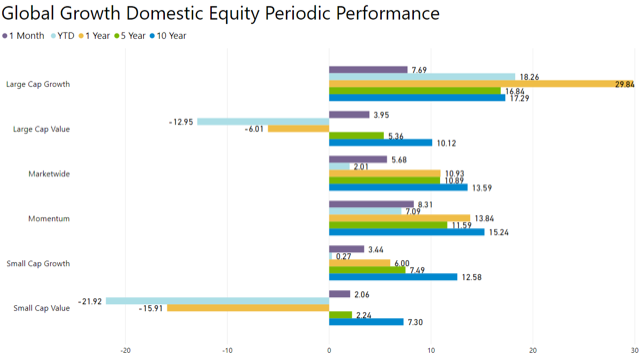
FOREIGN EQUITY FACTORS
Emerging Market Small-Cap Companies Continue to Climb
In the international developed markets, value underperformed growth in the large-cap space and small-cap space. Momentum recorded a gain of 5.65% while small-cap emerging market stocks posted a return of 8.44%. Foreign momentum strategies have performed well year to date and over the past twelve months.
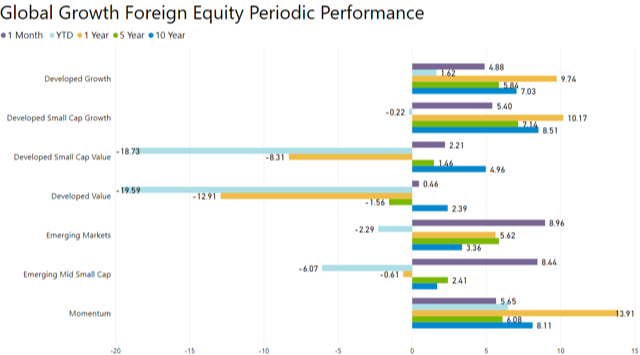
LIQUIDITY PROVIDERS
Interest Rates to Remain Low
In July, the three-month Treasury bill index returned 0.02% for the month. Interest rates on Treasury bills and money market funds are close to 0%. Savers may face low rates for a long period of time, which will negatively impact retirees and people close to retirement. The CPI decreased by -0.80% through June.
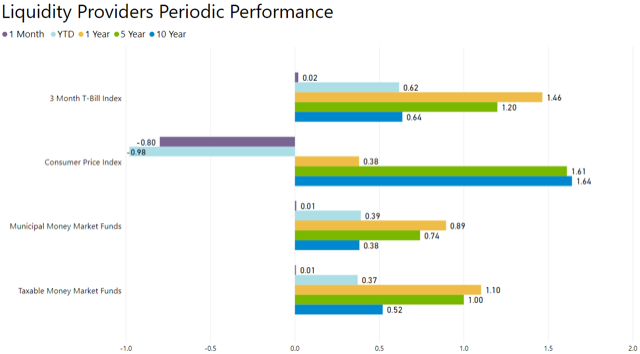
DISINFLATION DEFLATIONARY HEDGES
Long-Term Treasuries Continue to Reward Investors
The returns of deflationary hedges were mostly positive for the month. High yield and long-term government bonds returned 4.78% and 4.18%, respectively. Long-term government bonds are up 26.02% year to date. The Bloomberg Barclays U.S. Agg Bond Index returned 1.49% in July. Riskier forms of credit such as high-yield bonds, leveraged loans, and BDCs are still negative for the year.
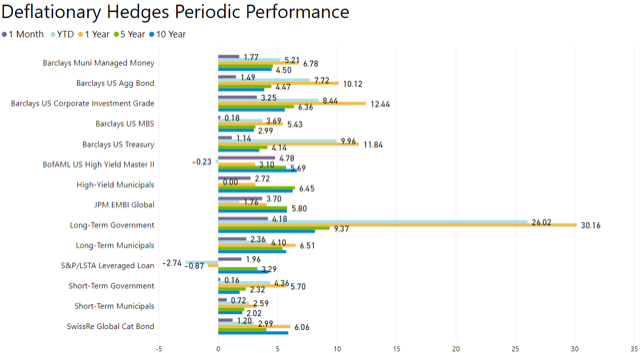
INFLATION SENSITIVE INVESTMENTS
Gold Price Continues to Climb
Inflation-sensitive investment returns were mostly positive for the month. Gold bullion posted a gain of 11.13%. The Alerian MLP index dropped by -3.55% in July. Gold bullion is up 29.72% YTD, outperforming most other assets. Gold miners have also outperformed as they provide levered exposure to the gold price. Domestic and foreign REITs are still down approximately -20%.
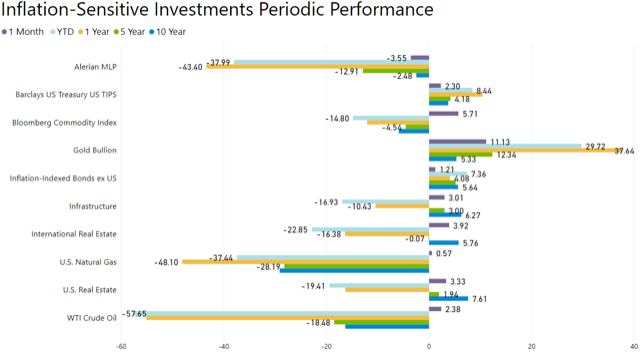
WORLD CURRENCIES
U.S. Dollar Depreciating
Over the past three months, the U.S. dollar depreciated against most major currencies. The Euro notably gained 8.22% versus the U.S. dollar. Over the past year, the U.S. dollar appreciated against most emerging market currencies but depreciated against developed market currencies. The continuation of large U.S. fiscal stimulus packages may weigh on the U.S. dollar in the medium-term to long-term while the government’s inability to control COVID-19 has also depressed rates. The dollar has been ascendant most of the time since the financial crisis. A depreciating dollar is good news for foreign stock markets and inflation-sensitive investments.
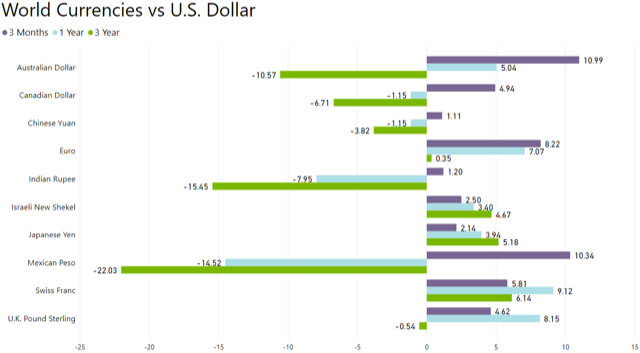
Brandon Yee, CFA, CAIA – Research Analyst
Brandon conducts investment due diligence for Versant Capital Management, and designs and implements tools and processes to support the firm’s research. His background in biology and finance help him to look at challenges from multiple angles, resulting in unique and well-rounded approaches and solutions.
Disclosure: Please remember that past performance may not be indicative of future results. Different types of investments involve varying degrees of risk, and there can be no assurance that the future performance of any specific investment, investment strategy, or product (including the investments and/or investment strategies recommended or undertaken by Versant Capital Management, Inc.), or any non-investment related content, made reference to directly or indirectly in this article will be profitable, equal any corresponding indicated historical performance level(s), be suitable for your portfolio or individual situation, or prove successful. Due to various factors, including changing market conditions and/or applicable laws, the content may no longer be reflective of current opinions or positions. Moreover, you should not assume that any discussion or information contained in this article serves as the receipt of, or as a substitute for, personalized investment advice from Versant Capital Management, Inc. To the extent that a reader has any questions regarding the applicability of any specific issue discussed above to his/her individual situation, he/she is encouraged to consult with the professional advisor of his/her choosing. Versant Capital Management, Inc. is neither a law firm nor a certified public accounting firm and no portion of the article content should be construed as legal or accounting advice. If you are a Versant Capital Management, Inc. client, please remember to contact Versant Capital Management, Inc., in writing, if there are any changes in your personal/financial situation or investment objectives for the purpose of reviewing/evaluating/revising our previous recommendations and/or services. A copy of the Versant Capital Management, Inc.’s current written disclosure statement discussing our advisory services and fees is available upon request.
